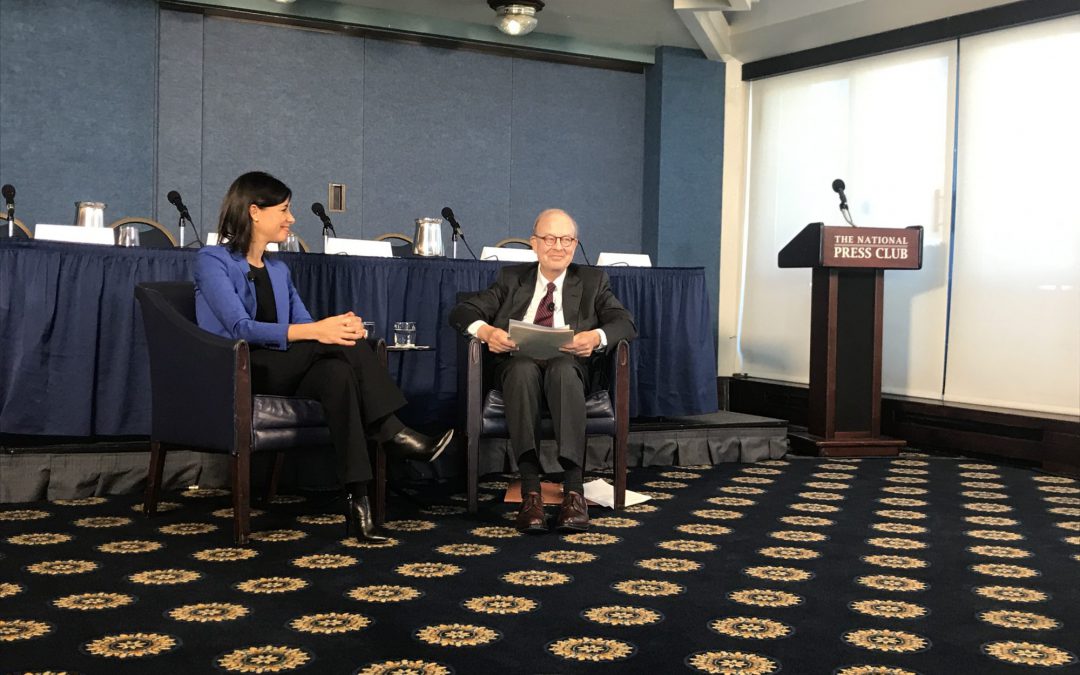WASHINGTON – Last fall when Debbie Goldman was outside the Chevy Chase Community Center in Northwest Washington distributing literature on Election Day, she saw a family run to the library across the street. It was 5:15 p.m. The library was closed.
The mother told Goldman that earlier that day people on her commute had told her it closed at 7 p.m., but they were talking about the polls, not the library. Her daughter’s school operates over the Cloud and she needed to download her homework assignment, finish it using the library’s internet access and upload it that night.
“She was bereft,” Goldman said. “I stopped passing out literature and said, ‘Come to my house,’ and she finished her homework at my house. Nobody should have to have that choice.”
A 2017 congressional economic report found that 34 million Americans do not have a broadband provider in their community. In 15 states, the majority of rural residents do not access to broadband and 12 million children, like the one Goldman described, do not live in homes with a connection, the report said. Broadband is the high-speed transmission that allows for 5G technology, sending audio and video digitally and for students to complete assignments and access other educational resources.
FCC Commissioner Jessica Rosenworcel and former Rep. Rich Boucher, a Democrat who now is honorary chairman of the Internet Innovation Alliance – a mix of businesses and nonprofits, said Tuesday that the FCC should buy back unused educational broadband licenses and sell them to commercial mobile carriers to create a fund for wireless access in rural areas so their students would have access to high-speed internet, speaking at an Internet Innovation Alliance event where Goldman was a panelist.
They proposed auctioning Education Broadband Spectrum licenses, which are only given to education institutions such as universities and educational nonprofits that teach students. The proceeds would help the federal government create programs that would provide high-speed internet access to students in rural communities.
“The majority of today’s teachers routinely make homework assignments with the expectation that students will go online to complete the work,” Boucher said. “But students don’t have equal access to high-speed broadband, and it’s frankly inequitable for some students to stay up late doing homework simply because of a slow or no connection.”
The Kennedy administration started licensing the Educational Broadband Spectrum — formerly the Instructional Television Fixed Service – to universities, colleges and nonprofits to deliver live or pre-recorded television to sites within school districts and university campuses.
Rosenworcel said the idea never really took off at schools because at that time television programming “was not in their DNA.” So, in the mid-2000s, the FCC began allowing institutions that held licenses to lease up to 95 percent of their capacity to commercial providers and renamed it the Educational Broadband Service. The FCC estimates that over 90 percent of licenses are leased to commercial providers.
Rosenworcel said the auction would give the educational institutions that hold licenses the option of either keeping their license or selling it back to the government, which would then sell it to commercial providers. The FCC could then create a fund that would go to solutions for the what she called the homework gap, like providing wi-fi on buses and loaning out hotspots, she said.
But Katherine Messier, director of development at the North American Catholic Educational Programming Foundation, said it is better for current license holders, like her own organization, to partner with private commercial providers to expand access to rural areas. Her organization is a nonprofit that provides high-speed broadband and educational resources by leasing out its EBS license to commercial networks.
Messier said a survey commissioned by her organization last year showed that 73 percent of low-income families using that service had never had home broadband access before. Their service supports 920 public libraries, 850 schools and over 4,600 nonprofits across the country, including some rural areas. She added that there should be multiple approaches to solving the digital divide, including giving rural operators priority windows to partner with EBS licensees and using funds from FCC auctions that have already started to avoid a possible lengthy process of an EBS-specific auction.
Zach Leverenz, CEO and founder of a nonprofit that represents low-income Americans without internet access called EveryoneOn, said there is not enough transparency about the value of either the current licenses or funds from a potential auction since EBS leasing contracts are private.
He added that before moving forward with starting an auction, the public should know if legislation is needed to ensure that the revenue goes specifically to fixing the homework gap.
“We need the information,” Leverenz said. “Leaping to an incentive auction or allowing for the existing model to continue the way it looks today are both failing the public this is intending to serve.”
Rosenworcel said in an interview that she wants the FCC to explore how to have more transparency in the EBS leasing process, give EBS licensees more options for their licenses and come up with funds to fix the homework gap.
She said she is interested in “every alternative” that includes providing more broadband access to students in rural areas and low-income students who cannot afford high-speed home broadband.
Rosenworcel added that while legislation is one avenue the FCC can explore for forming a fund, she believes there are ways for the agency to create the fund on its own.
“The agency can move fast when it wants to,” Rosenworcel said. “We have 12 million students that are affected by the homework gap. We are leaving children offline when they need to be online to succeed in school.”


